Is It Safe to Eat Green Tea Leaves
Green tea leaves are generally safe to eat, but they come with both benefits and risks. You'll get a concentrated dose of antioxidants, vitamins, and minerals when consuming whole leaves. However, eating them directly can cause digestive issues like stomach upset and constipation. The higher caffeine content in whole leaves may lead to jitters or insomnia. It's vital to source high-quality, pesticide-free leaves and consume them in moderation. Most experts recommend sticking to traditional brewing methods for ideal safety and benefits. If you're considering adding green tea leaves to your diet, consult with a healthcare provider first. There's more to explore about the potential effects of eating green tea leaves.
This post may contain affiliate links. If you make a purchase through these links, I may earn a commission at no additional cost to you. Additionally, portions of this post may be generated using artificial intelligence (AI) technology. While we strive for accuracy, please be aware that AI-generated content may not always be perfect and should be fact-checked when necessary.
The Spatula Scoops
- Eating green tea leaves is generally safe in moderation but can cause digestive issues due to their fibrous nature.
- Consuming whole leaves may provide more concentrated nutrients but also increases caffeine intake, potentially leading to side effects.
- Pesticide residues on tea leaves can be a concern, making it important to source high-quality, organic leaves.
- Brewing tea is gentler on the digestive system and allows better control over strength and flavor compared to eating whole leaves.
- People with sensitive stomachs or pre-existing digestive conditions should avoid consuming whole green tea leaves.
Nutritional Profile of Green Tea Leaves
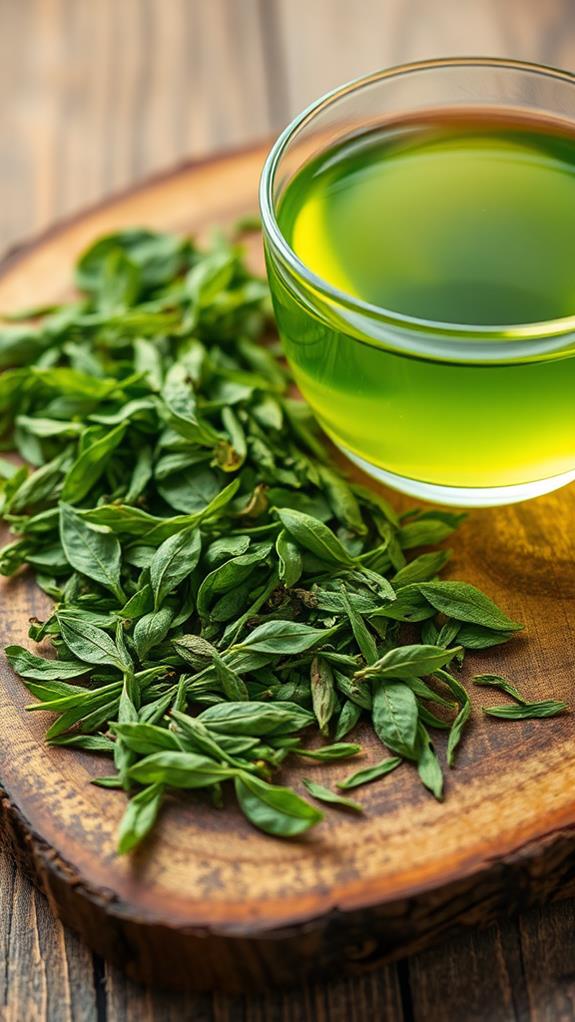
Green tea leaves pack a powerful nutritional punch. They're rich in polyphenols, particularly catechins, which are potent antioxidants. These compounds help protect your cells from damage caused by free radicals. You'll also find a good amount of vitamins and minerals in green tea leaves, including vitamin C, vitamin B complex, and trace minerals like zinc and selenium. Jade Leaf Matcha, sourced from family-owned farms in Japan, offers a high-quality option for those looking to incorporate green tea leaves into their diet.
One of the most notable components of green tea leaves is L-theanine, an amino acid that can promote relaxation without causing drowsiness. It's often credited for the calm alertness many people experience when drinking green tea. The leaves also contain caffeine, though in lower amounts than coffee beans.
Green tea leaves are a source of dietary fiber, which can aid digestion and promote feelings of fullness. They're also low in calories, making them a potentially beneficial addition to a weight management plan. However, it's crucial to recognize that the nutritional profile can vary depending on factors like growing conditions, processing methods, and storage. When consuming green tea leaves, you're getting these nutrients in a more concentrated form than you would from brewed tea.
Potential Health Benefits
The nutritional richness of green tea leaves translates into numerous potential health benefits. When you consume green tea leaves, you're ingesting a concentrated source of antioxidants, particularly catechins. These compounds may help protect your cells from damage caused by free radicals, potentially reducing the risk of chronic diseases.
| Benefit | Mechanism | Potential Impact |
|---|---|---|
| Heart Health | Lowering cholesterol | Reduced cardiovascular risk |
| Weight Management | Boosting metabolism | Increased fat burning |
| Brain Function | Improving blood flow | Enhanced cognitive performance |
You'll also find that eating green tea leaves might support your immune system, thanks to their high vitamin C content. The leaves' natural caffeine and L-theanine combination could provide a smoother, more sustained energy boost compared to coffee. Additionally, the polyphenols in green tea leaves may contribute to better oral health by inhibiting bacterial growth and reducing inflammation in your gums.
It's important to note that while these potential benefits are promising, more research is needed to fully understand the effects of consuming whole green tea leaves. As with any dietary change, it's wise to consult with a healthcare professional before incorporating green tea leaves into your regular diet.
Risks and Side Effects
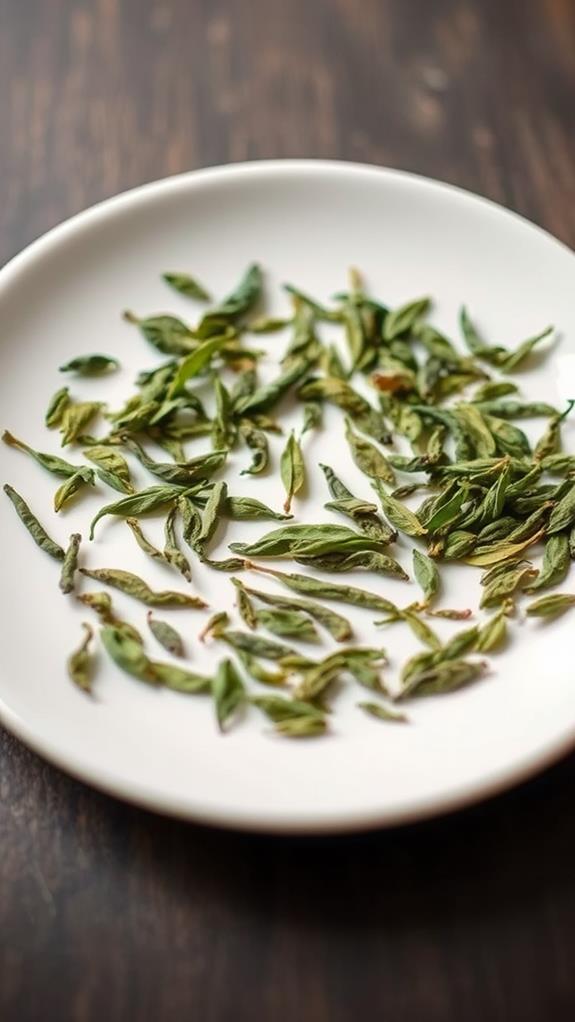
While eating green tea leaves offers potential benefits, you should be aware of some risks. Similar to bay leaves' indigestibility, whole green tea leaves can be difficult for the body to process. You might experience side effects like caffeine sensitivity or digestive irritation if you consume too many tea leaves. There's also a concern about pesticide residues on tea leaves, especially if they're not thoroughly washed or sourced from reputable suppliers.
Caffeine Sensitivity and Overconsumption
Many people enjoy green tea for its health benefits, but consuming the leaves directly can lead to potential risks. When you eat green tea leaves, you're ingesting a more concentrated form of caffeine than you'd get from drinking brewed tea. This can be problematic if you're sensitive to caffeine or if you consume too much.
Caffeine sensitivity and overconsumption can result in:
- Increased heart rate and palpitations
- Difficulty sleeping or insomnia
- Anxiety and restlessness
- Digestive issues, including nausea and stomach upset
If you're not used to high caffeine intake, eating green tea leaves might lead to these symptoms more quickly than drinking brewed tea. It's important to be aware of your body's reaction to caffeine and moderate your consumption accordingly. Remember that the caffeine content in tea leaves can vary depending on factors like the plant's growing conditions and processing methods. If you're considering adding green tea leaves to your diet, start with small amounts and monitor how your body responds. If you experience any adverse effects, it's best to consult with a healthcare professional before continuing this practice.
Pesticide Residue Concerns
Another important consideration when eating green tea leaves is the potential presence of pesticide residues. Like many crops, tea plants are often treated with pesticides to protect them from insects and diseases. While these chemicals help guarantee a healthy harvest, they can leave behind residues that may be harmful if consumed in large quantities.
When you're drinking brewed tea, most pesticide residues are filtered out during the steeping process. However, when you eat whole tea leaves, you're potentially ingesting any residues that might be present on the leaf surface. This exposure can be more significant than what you'd typically get from drinking tea.
To minimize your risk, opt for organic green tea leaves whenever possible. These are grown without synthetic pesticides, reducing the likelihood of harmful residues. You can also wash the leaves thoroughly before consuming them, which may help remove some surface contaminants. It's worth noting that some countries have stricter regulations on pesticide use in tea production than others. As such, researching the origin of your tea and choosing reputable sources can provide an additional layer of safety when incorporating green tea leaves into your diet.
Digestive System Irritation
Consuming whole green tea leaves can sometimes lead to digestive system irritation. While green tea is generally considered safe, eating the leaves directly may cause discomfort for some people. Your digestive system might struggle to break down the fibrous plant material, potentially resulting in various gastrointestinal issues.
Potential digestive problems you might experience when eating green tea leaves:
- Stomach upset and nausea
- Bloating and gas
- Constipation or diarrhea
- Acid reflux or heartburn
The tannins present in green tea leaves can also irritate your stomach lining, especially if consumed on an empty stomach. This irritation may lead to increased acid production, causing discomfort or pain. Additionally, the caffeine content in green tea leaves can stimulate excessive gastric acid secretion, potentially exacerbating existing digestive issues.
If you have a sensitive stomach or pre-existing digestive conditions, it would be prudent to avoid consuming whole green tea leaves. Instead, opt for traditional brewed green tea or consult with a healthcare professional before incorporating tea leaves into your diet. Remember, moderation is crucial when exploring new dietary habits, and it's advisable to listen to your body's signals.
Traditional Consumption Methods
For centuries, people have enjoyed green tea primarily as a brewed beverage. You'll find that traditional consumption methods focus on steeping the leaves in hot water, then discarding them after extraction. This process allows you to enjoy the tea's flavor and benefits without ingesting the actual leaves.
In many Asian cultures, you'll encounter various brewing techniques. For instance, Japanese tea ceremonies involve a precise ritual of preparing and serving matcha, a powdered green tea. Chinese gongfu tea preparation uses multiple short steeps to extract different flavors from the leaves. These methods maximize the tea's nutritional value while minimizing potential digestive issues. Traditional matcha preparation often involves using specialized tools like bamboo whisks and scoops to achieve the perfect frothy texture and precise measurements.
You might also come across green tea in other forms, such as extracts or supplements. These products often concentrate the tea's beneficial compounds, like catechins and polyphenols, without the need to consume whole leaves. When exploring these options, it's important to consider their bioavailability – the rate at which your body can absorb and utilize these compounds. Always follow recommended dosages and consult with a healthcare professional before incorporating new supplements into your routine.
Modern Culinary Applications
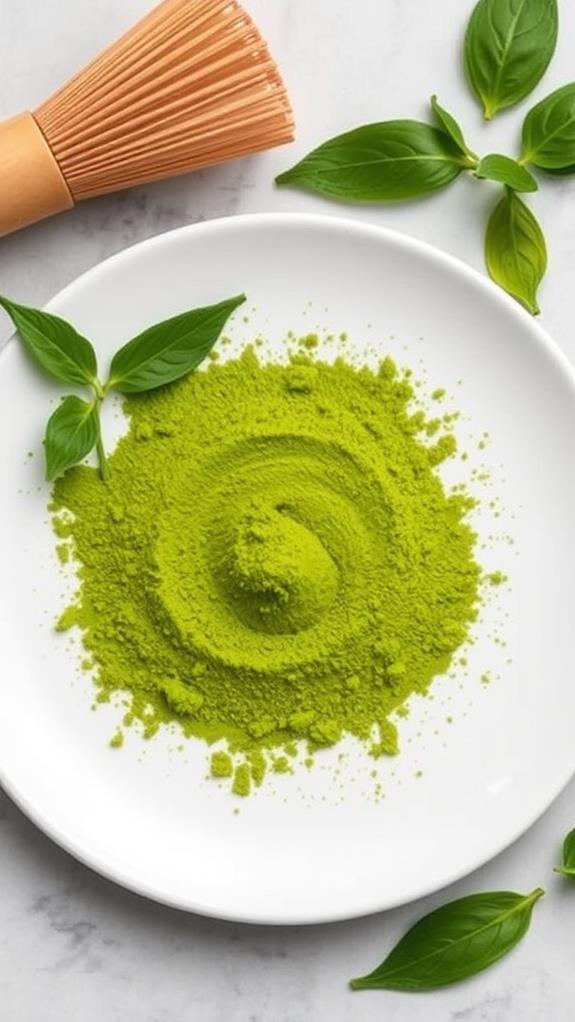
Creativity in modern cuisine has led to innovative uses of green tea leaves beyond traditional brewing methods. You'll find chefs and home cooks alike incorporating these nutrient-rich leaves into a variety of dishes. Green tea leaves are now being used as a flavoring agent, garnish, and even a main ingredient in both sweet and savory recipes.
Here are some popular modern culinary applications for green tea leaves:
- Matcha powder in baked goods and smoothies
- Whole leaves as a seasoning for meats and vegetables
- Green tea-infused oils and vinaigrettes
- Tea leaf-based pesto or spreads
You can experiment with adding finely ground green tea leaves to your baking recipes, such as cookies, cakes, or bread. The leaves impart a subtle, earthy flavor and a vibrant green color. In savory dishes, you might try using whole or chopped leaves as a rub for grilled meats or fish. Green tea-infused oils can be used for cooking or as a finishing touch on salads. When incorporating green tea leaves into your cooking, remember that a little goes a long way. Start with small amounts and adjust to taste, as the flavor can be quite potent.
Brewing vs. Eating Whole Leaves
When it comes to green tea, you're faced with two primary options: brewing the leaves or eating them whole. The traditional method involves steeping the leaves in hot water, extracting their beneficial compounds and creating a flavorful beverage. This process, known as infusion, releases catechins, polyphenols, and other antioxidants into the water, making them easily digestible.
Eating whole leaves, on the other hand, means you're consuming the entire leaf, either fresh or dried. While this method provides you with all the fiber and nutrients present in the leaf, it may be harder for your body to absorb some compounds. The leaf's cellular structure can impede the release of certain beneficial elements.
Brewing allows for better control over the strength and flavor of your tea, as you can adjust steeping time and water temperature. It's also gentler on your digestive system. Eating whole leaves might provide a more concentrated dose of nutrients, but it can be tough on your stomach and may lead to discomfort for some people. Additionally, the taste of whole leaves can be quite bitter and astringent, which might not appeal to everyone's palate.
Recommended Dosage and Precautions
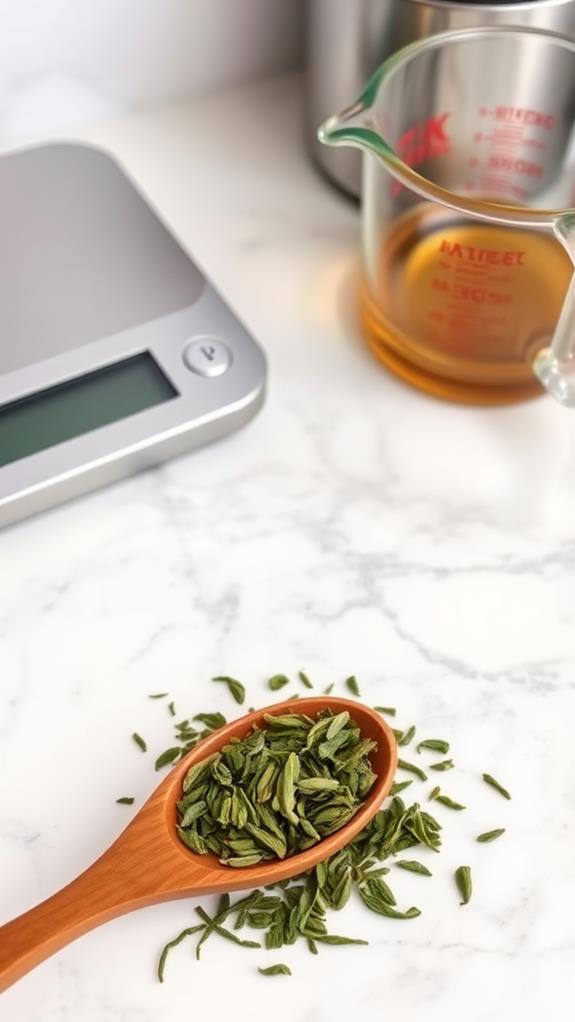
Dosage guidelines for consuming green tea leaves vary depending on your method of intake. If you're brewing tea, aim for 2-3 cups daily. For whole leaves, start with a small amount, about 1-2 grams, and gradually increase as tolerated. It's important to be aware of potential side effects and take precautions when consuming green tea leaves.
Some key points to ponder:
- Caffeine sensitivity: Green tea contains caffeine, which may cause jitters, insomnia, or anxiety in sensitive individuals.
- Iron absorption: Tannins in green tea can interfere with iron absorption, so avoid consuming it with iron-rich meals.
- Medication interactions: Green tea may interact with certain medications, including blood thinners and stimulants.
- Pregnancy and breastfeeding: Limit intake during pregnancy and while breastfeeding due to caffeine content.
When introducing green tea leaves into your diet, monitor your body's response. If you experience adverse effects, reduce your intake or consult a healthcare professional. Remember, while green tea offers numerous health benefits, moderation is key. By following these guidelines and listening to your body, you can safely incorporate green tea leaves into your diet and reap their nutritional rewards.
Sourcing and Quality Considerations
The quality and source of your green tea leaves play an essential role in their safety and potential health benefits. When selecting green tea leaves for consumption, you'll want to prioritize organic, pesticide-free options. These guarantee you're not ingesting harmful chemicals along with your tea leaves.
Look for reputable suppliers who can provide information about their sourcing practices. Ideally, choose tea leaves from regions known for their high-quality green tea production, such as Japan, China, or specific areas within these countries. Pay attention to the harvesting and processing methods, as these can affect the tea's nutritional content and safety.
Consider the grade of the tea leaves. Higher grades often indicate better quality and potentially safer consumption. However, keep in mind that even high-quality tea leaves may contain trace amounts of heavy metals or other contaminants due to environmental factors. To mitigate risks, diversify your tea sources and avoid consuming excessive amounts from a single origin.
Lastly, proper storage is imperative. Store your green tea leaves in an airtight container, away from light, heat, and moisture to prevent degradation and potential mold growth.
Expert Opinions and Research Findings
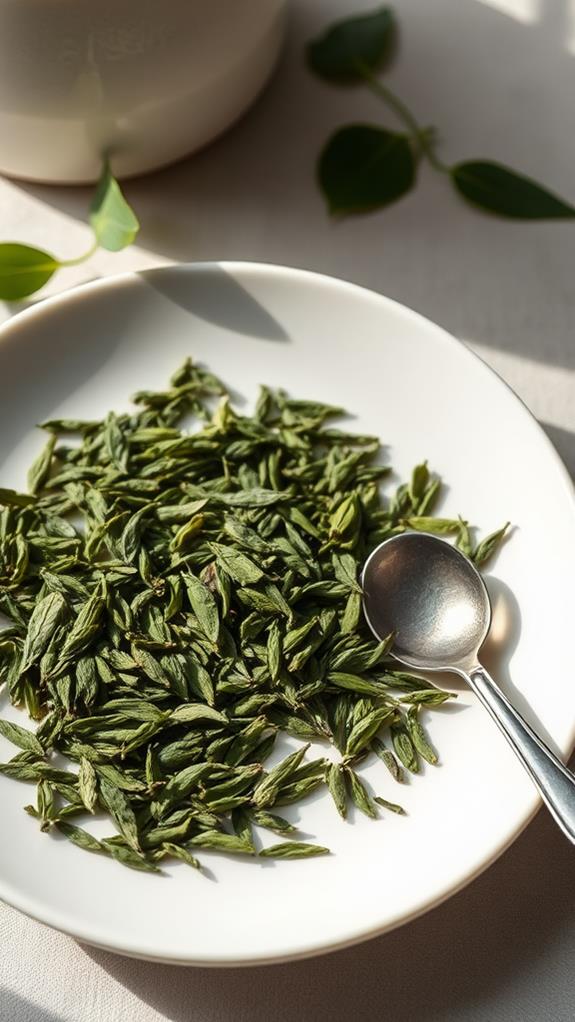
You'll find that expert opinions on eating green tea leaves vary, but many nutritionists and researchers agree it's generally safe in moderation. Scientific studies have shown potential health benefits from consuming whole tea leaves, including increased antioxidant intake and improved digestion. However, medical professionals often recommend consulting with your doctor before adding green tea leaves to your diet, especially if you have certain health conditions or are taking medications.
Nutritional Expert Perspectives
Nutritional experts weigh in on the safety and potential benefits of consuming green tea leaves. They generally agree that eating whole green tea leaves is safe for most people when done in moderation. However, they caution that the concentrated nutrients in whole leaves may lead to side effects if consumed excessively.
Experts highlight several key points regarding green tea leaf consumption:
- Higher nutrient density: Whole leaves contain more antioxidants, vitamins, and minerals than brewed tea.
- Increased caffeine intake: Eating leaves may result in higher caffeine consumption compared to drinking tea.
- Potential digestive issues: Some people may experience stomach discomfort due to the leaves' fiber content.
- Interaction with medications: Compounds in green tea leaves may interfere with certain drugs.
You'll find that most nutritionists recommend starting with small amounts of green tea leaves to assess your tolerance. They suggest incorporating them into smoothies, salads, or as a garnish rather than consuming large quantities raw. It is crucial to understand that while green tea leaves offer potential health benefits, they're not a substitute for a balanced diet. Always consult with a healthcare professional before making significant changes to your diet, especially if you have pre-existing health conditions or take medications regularly.
Scientific Studies Overview
Numerous scientific studies have examined the effects of consuming green tea leaves. Research has consistently shown that green tea leaves contain high concentrations of beneficial compounds, including catechins, polyphenols, and antioxidants. These substances have been linked to various health benefits, such as improved metabolism, reduced inflammation, and potential cancer-fighting properties.
You'll find that most studies focus on green tea in its brewed form, but some have investigated the effects of consuming whole leaves. A key element to ponder is the higher caffeine content in whole leaves compared to brewed tea. While moderate caffeine intake is generally safe for most adults, excessive consumption may lead to side effects like insomnia or jitters.
Studies have also highlighted potential concerns about the bioavailability of certain compounds in whole leaves. Your body may not absorb these substances as effectively from unprocessed leaves as it does from brewed tea. Additionally, research has shown that eating large quantities of tea leaves could potentially lead to excessive intake of certain minerals, such as manganese or aluminum. It's important to weigh these factors when deciding whether to incorporate whole green tea leaves into your diet.
Medical Professional Recommendations
Turning to expert opinions, medical professionals generally advise caution when consuming whole green tea leaves. While they acknowledge the potential health benefits, they emphasize the importance of moderation and proper preparation. Many doctors recommend sticking to traditional brewing methods rather than eating the leaves directly.
Medical professionals often highlight the following points regarding green tea leaf consumption:
- Caffeine content: Whole leaves contain more caffeine than brewed tea, which may cause adverse effects in sensitive individuals.
- Nutrient absorption: The body may struggle to extract nutrients from whole leaves compared to brewed tea.
- Digestive issues: Consuming large amounts of tea leaves can lead to stomach discomfort and constipation.
- Potential contaminants: Unwashed leaves may harbor pesticides or other harmful substances.
Experts suggest consulting with your healthcare provider before incorporating green tea leaves into your diet, especially if you have pre-existing conditions or take medications. They stress the importance of sourcing high-quality, organic tea leaves to minimize potential risks. While some studies show promising results, more research is needed to fully understand the long-term effects of eating green tea leaves.
Frequently Asked Questions
Can Pregnant Women Safely Consume Green Tea Leaves?
If you're pregnant, you should be cautious about consuming green tea leaves. While green tea offers health benefits, it contains caffeine and catechins, which can affect your pregnancy. You'll want to limit your intake, as excessive consumption may increase risks of complications. It's best to consult your healthcare provider for personalized advice. They'll consider your specific health needs and can recommend safe alternatives or appropriate serving sizes if you choose to include green tea leaves in your diet.
How Do Green Tea Leaves Affect Medication Absorption?
You might be surprised to learn that green tea leaves can significantly impact medication absorption. They contain compounds that interact with certain drugs, potentially altering their effectiveness. For instance, green tea can reduce the absorption of iron supplements and increase the effects of blood thinners. It's pivotal to consult your healthcare provider about potential interactions, especially if you're taking medications regularly. They'll advise you on whether it's safe to consume green tea leaves alongside your specific prescriptions.
Are There Different Varieties of Green Tea Leaves for Eating?
Yes, there are various types of green tea leaves you can eat. You'll find different varieties based on factors like growing region, processing methods, and harvest time. Some popular options include Sencha, Gyokuro, and Matcha. Each variety has its unique flavor profile and nutritional content. When choosing leaves for eating, consider their texture and taste. Some are more delicate, while others have a stronger, grassier flavor. It's worth experimenting to find the type that suits your palate best.
Can Green Tea Leaves Be Used Topically for Skin Benefits?
Like a gentle breeze caressing your skin, green tea leaves can indeed be used topically for various skin benefits. You'll find that they're rich in antioxidants and anti-inflammatory properties. When applied externally, green tea leaves can help soothe irritated skin, reduce puffiness, and fight signs of aging. You can create DIY face masks or compresses using steeped leaves, or look for skincare products that incorporate green tea extract. However, it's always wise to patch test before applying any new substance to your skin.
Do Green Tea Leaves Lose Nutritional Value When Cooked or Processed?
When you cook or process green tea leaves, you'll find that they do lose some of their nutritional value. Heat can break down certain compounds, like catechins, which are powerful antioxidants. However, it's not all lost. You'll still retain many beneficial nutrients, including flavonoids and minerals. The degree of loss depends on the processing method. For example, steaming might preserve more nutrients than roasting. To maximize benefits, you might consider consuming both raw and processed green tea leaves in your diet.
Conclusion
Just as you wouldn't eat a whole apple tree to enjoy its fruit, consuming green tea leaves directly isn't necessary to reap their benefits. While it's generally safe to eat green tea leaves in moderation, you'll get the most out of them through traditional brewing methods. If you're curious about incorporating whole leaves into your diet, start small and consult with a healthcare professional, especially if you have any pre-existing conditions or take medications that might interact with tea compounds.





